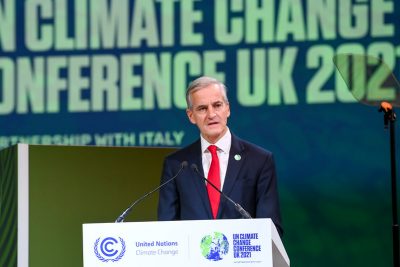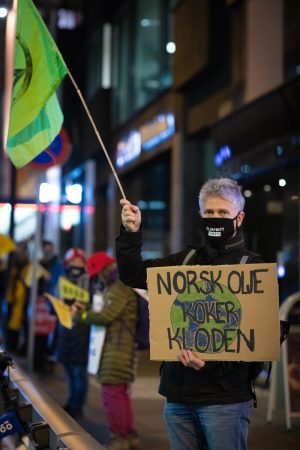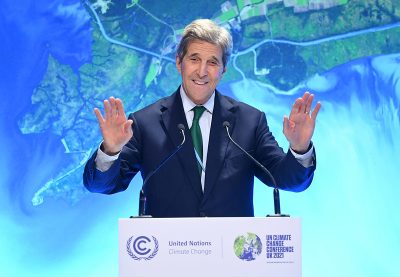NEWS ANALYSIS: Halfway through the UN Climate Change Conference in Glasgow, Norway is still mostly throwing more money at others to cut emissions while literally fueling them at home. The oil-producing country’s new government may even get away with it, once again.

In his first international appearance in Glasgow last week as Norway’s prime minister, Jonas Gahr Støre predictably argued that Norway’s oil and gas aren’t the problem but rather part of the solution to the climate crisis. His Labour Party constituency at home and his pro-oil Center Party government partner wouldn’t have accepted anything else: There’s simply too much money at stake, and too many jobs at risk, if Norway were to act on international pleas to halt more oil exploration and start reducing oil and gas production on the Norwegian Continental Shelf.
Støre repeated Norway’s long-term strategy of tapping into its oil wealth to double its funding for support to poor countries suffering the most from climate change. The money is meant to support investments that will help phase out poor countries’ use of coal and other fossil energy sources, and boost renewable energy projects, although the Norwegian government hasn’t fully clarified whether the funding will come at the expense of other portions of Norway’s foreign aid budget.
He also confirmed planned use of Norway’s huge sovereign wealth fund, pumped up by oil revenues over the past two decades, to help fund “responsible investments” and manage climate risk. He further promised, as Norwegian prime ministers have for the past 30 years, that his new Labour-Center government will move forward with the so-called “green shift” to a less-oil-dependent economy. Støre spoke of goals aimed at developing and exporting new Norwegian technology that can be helpful in similar “green shifts” abroad, claiming Norway is in a position to take a leading role in offshore wind power, greener shipping, carbon capture and storage, hydrogen and electrification projects.
Støre also repeated promises that Norway will cut its own emissions, now even by as much as 55 percent by 2030, and remains committed to keeping global warming at 1.5 degrees.
The problem, according to critics, is that Norway’s credibility in reaching such goals remains doubtful since Støre continues to also claim, even in Glasgow, that his government will “develop, not phase out, Norway’s own oil and gas industry.” His government’s platform, critics note, also promises “a continued high level of activity” on Norwegian offshore oil fields.
Emission figures confirmed last week by Norway’s own Cicero Center for Climate Research show that the country’s own emissions per capita would be higher than China’s if those generated by the Norwegian oil and gas it exports were included. Fortunately for Norway, they’re not, but there’s no question Norway as an oil and gas producer shares huge responsibility for climage change. That’s why Støre’s declarations in Glasgow failed to impress many both at home and abroad.

Jan Thomas Odegard, leader of Norway’s independent Utviklingsfondet (The Development Fund) to fight hunger and poverty, all but scoffed at Støre’s opening speech in Glasgow. He claimed it utterly lacked recognition of just how serious the climate crisis is for the world’s poorest “and seemed more like a sales-pitch for Norwegian technology, wealth and markets.”
Odegard, writing in a commentary in Oslo newspaper Dagsavisen over the weekend, also noted how Norway won the dubious distinction in Glasgow as “Fossil of the Day” last Tuesday. It was awarded by the Climate Action Network, representing 1,500 environmental organizations around the world. The unwanted prize, awarded to the country that “does the most to contribute the least during climate negotiations,” was based on how Støre promoted Norway’s own oil and gas industry along with capture and storage of its carbon emissions, and how Norway will continue to exploit its oil and gas resources in defiance of the UN itself and other international organizations.
“It’s not the first time Norway has been granted this prize at a UN summit, since Norway’s reliance on oil and gas has long been in contrast to its ambitions of portraying itself as an environmentally conscious nation,” Odegard wrote. “Just as embarrassing as the prime minister’s promotion of Norwegian technology and gas was his failure to mention all the negative consequences climate change has on millions of poor people all over the world, and Norway’s responsibility for that as an oil- and gas nation.”
Like several others, Odegard stresses how Norway, as a country “that’s grown wealthy on carbon emissions,” has a “special responsibility to display solidarity between its words and its actions.” He called it “an uncomfortable reality” that Norwegian government leaders still have trouble accepting.
Other Norwegian ministers’ glaring absence
Among those often trying to avoid that “uncomfortable reality” is Støre’s government coalition parther Trygve Slagsvold Vedum of the Center Party, who’s also Norway’s new finance minister. Center has long been reluctant to face up to oil’s destructive international and climate implications, and last week was no exception. While scores of finance ministers from around the world (including the US’ Secretary of the Treasury and former Federal Reserve Bank boss Janet Yellen) found time to travel to Glasgow last week, because of the climate crises’ urgency, Vedum did not. Nor did he take time to explain to Norwegian reporters why he didn’t make Glasgow a priority, leaving it to one of his state secretaries to tell newspaper Dagens Næringsliv (DN) that Vedum was too busy working on the new government’s revised state budget.

“Norway is well-represented at the climate summit in Glasgow with the prime minister and the climate and environment minister (Espen Barth Eide of Labour, who’ll be returning to Glagow this week),” state secretary Lars Vangen told DN. Vangen neglected to note that Center’s own new minister in charge of foreign aid, Anne Beathe Tvinnereim, made an appearance, too, but there were no Norwegian government ministers present on the third day of the Glasgow summit when climate finance topped the agenda.
DN noted how Yellen declared she “wouldn’t have have been doing my job” if she hadn’t taken the climate crisis seriously enough to travel to Glasgow. Vangen, however, said Norway’s own finance minister “was preoccupied with work” on the state budget where climate measures “would have important priority.”
Others weren’t convinced, especially since Norway intends to also pay its way out of climate commitments by boosting financial support for deforestation in addition to renewable energy investments abroad. “The finance minister plays a central role in the climate battle,” Member of Parliament Lars Haltbrekken told DN. Haltbrekken is a former head of Norway’s chapter of Friends of the Earth and represents the Socialist Left Party (SV), on whom both Støre and Vedum must rely for majority support in Parliament. “It’s strange the Norwegian finance minister opted to stay home.” Norway’s new Oil & Energy Minister stayed home, too, thus avoiding any risk of venturing into the lion’s den.
There was some important progress during Glasgow’s first week, with Norway also agreeing to commit more money (along with other countries and big companies) to halt deforestation. There was also international agreement to cut methane gas emissions, many of which come from agriculture, leaks during oil and gas production, draining of marshes and melting of the permafrost. Norway went along with the plan, but Støre wouldn’t commit to cutting more methane emissions at home in Norway, arguing that many already have been cut on Norwegian oil fields. He’s also keenly aware that the farmer-friendly Center Party thinks farmers get too much of the blame for methane gas emissions.
It should be mentioned that Norwegians in general already pay among the highest fuel taxes in the world (a gallon of gasoline at the pump currently costs the equivalent of more than USD 9), along with those on automobiles and other users of fossil energy. Norwegians also pay a much higher share of climate-related fees and taxes than the industries generating them do, and Støre’s new government is concerned about a public backlash if fees and climate measures become even more onerous. Cutting back on oil production would do more to cut Norway’s own emissions than all those generated by automobiles, but that’s just not happening.

The bottom line is that not much has changed with Norway’s new government this fall, regarding oil or climate policy. Newspaper Morgenbladet has ironically reported how difficult it was to detect any disagreement between the spokespersons for energy policy for both the Conservatives and Labour prior to the September election. Neither were willing to cut back on Norway’s own oil industry, while both were optimistic about developing greener energy sources at the same time. Both were willing to donate lots of money to climate measures, as long as most of them are outside Norway.
That of course pleased energy czars like John Kerry of the US, who claimed he was grateful for Norway’s contributions to the climate and cooperation he’d experienced earlier. Støre and Norwegian Climate Minister Eide seemed to bask in Kerry’s presence when he also said he thought Norway could contribute a lot though its experience in shipping and oceanography.
“When we had our first oceans conference, Norway gave a million US dollars to combat problems for the seas,” Kerry told Norwegian Broadcasting (NRK). “Norway’s word and commitments have ever been in doubt for us.” Kerry diplomatically dodged questions about Norway’s ongoing oil and gas activity, not least at sea. He said he thinks Norway is dealing with that issue now, claiming that a process of phasing out oil is underway around the world. “The key is to what the researchers tell us we have to do,” he said, to maintaining the 1.5 degree goal.
Støre and Eide also received lots of friendly greetings last week, even from the UN Secretary General Antonio Guterres who has called for the halt to all further oil and gas exporation that Norwegian officials are ignoring. That, and Kerry’s flattery, indicate Norway may once again be able to leave a UN climate summit without making tougher commitments and carrying on with its oil and gas as before. Eide, meanwhile, will be partly responsible for negotiations over climate quotas during the week ahead.
Norwegian climate and environmental advocates in Glasgow continue to be frustrated by their own government. “I think it’s a shame that Støre used time at the conference to promote fossil energy, which then is misused by coal- and oil interests all over the world,” Truls Gulowsen, a former Greenpeace Norway chief who now heads Friends of the Earth (Naturvernforbund). Karoline Andaur, secretary general for WWF in Norway, agreed, claiming that Norway’s climate initiatves “pale in the oil glare.”
“If Norway really wants to contribute to reducing climate emissions, we must begin by limiting our own oil and gas production,” she told NRK in Glasgow. She thinks and hopes that Norway’s “double role” is now recognized internationally, and getting attention in Glasgow.
newsinenglish.no/Nina Berglund

